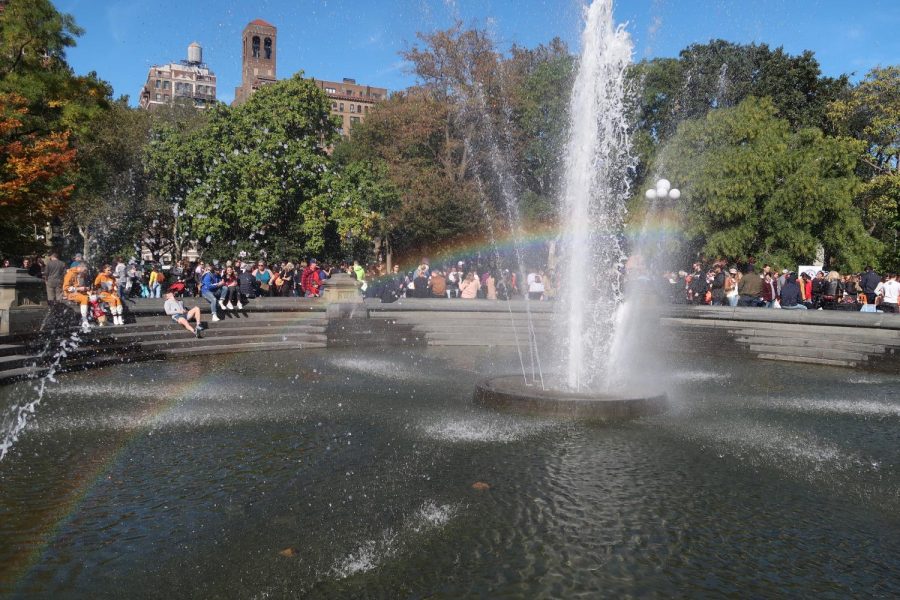Due to the abrupt move to remote classes for the rest of the semester after the outbreak of COVID-19, some students have relocated miles away from New York City, either in their home state or at another friend or family’s house. Many students have been taking advantage of the great outdoors to immerse themselves in the different nature scenes they don’t experience in the concrete jungle. In turn, this practice is also helping them deal with any anxieties about the virus.
Gallatin junior Jaime Ostrow is currently enjoying her time away from the city in sunny Fort Lauderdale, Fla.
“I spend almost every day outside,” Ostrow said. “I try to read and do homework in my backyard so I can be in the sun. The weather most definitely affects my mood and I feel very lucky to be able to wake up and spend most days outside.”
Similarly, California native and Tisch sophomore Ko Narter is visiting Austin, Texas for spring break, which turned into two months.
“I miss New York weather in the sense that the changing of seasons is exciting, and when it finally gets warm in New York I feel like I’ve earned it, but I’m not complaining at all about the warmth and sun here,” she told WSN through email.
Stern sophomore Neyl Loukil-Borrás has also been staying away from home with his friend, Steinhardt sophomore Ellie Condello, and her family in the Bay Area. He chose not to fly back to his hometown of Munich, Germany, because of the unavailability of flights due to the border closure and fear of possibly spreading the virus.
“The weather here is beautiful,” Loukil-Borrás said. “The sun is out nearly everyday and has definitely affected my mood positively.”
On the contrary, Steinhardt sophomore Hannah Heil is staying in Grand Lake, Colo. While she appreciates the beautiful Rockies, she is missing the city as well.
“The weather is very up in down [sic] in Colorado,” said Heil. “For the first few weeks, it was snowing a lot on and off and I definitely was missing the New York spring, but lately it has been really nice and sunny out.”
For some students, being outside has improved their mental health drastically.
“Spending time outside has definitely helped me during this quarantine,” Ostrow said. “Like I said earlier, I feel so lucky to have access to all of these things because not everyone does.”
Narter has also found this time refreshing, to both explore new areas where she doesn’t normally get to spend time, and to replace her commute time on walks around her neighborhood.
“My daily walks have saved me.” she admitted. “When I first got here, my dad and I drove to some trailheads and did some real hikes which was such a lovely contrast to the infinite amount of concrete in New York, but other than that I just try to access the nature around me.”
Loukil-Borrás, too, has loved his time spent in a different part of America since he lives in Europe.
“This time outside has really helped me stay sane,” Loukil-Borras said. “Getting to breath [sic] new fresh air and take in the sun has helped clear my mind and I have been able to focus on my work more afterwards. I am spending time outside nearly every day and remind myself to go outside everyday because I am lucky enough to have an outdoor space.”
Heil has used this time to honor herself through a balanced mix of celebrating the outdoors and resting inside.
“I am trying to spend some more time outside; going on walks, playing with my dog; and even just sitting outside when the sun is out,” she said. “I’ve always loved hiking, and in Colorado it’s especially beautiful, but I haven’t really had much time to discover something new during the quarantine.”
As for the future, some students are feeling a bit uneasy but are looking forward to returning to normal life.
“I really feel like life is on pause right now,” Narter said. “I’m in the middle of my degree, I don’t have anything major going on, and I’m just laying low, calling friends, making music and passing the time.”
However, most students know this time will pass and that we will return stronger than ever to the Big Apple as soon as possible.
“I am optimistic about the aftermath of COVID-19,” Ostrow said. “New York City has and will recover, it is only a matter of time. There will definitely be a transition period, but there is a learning lesson in everything.”
Heil agreed that while this period of uncertainty has been detrimental to the world, we are living in a historic time.
“It is a weird feeling, living through something so historic — although I wish it never happened, I am grateful for this insane experience and I know that I will cherish the time that I have left at NYU so much more.”
A version of this article appeared in the Monday, May 4, 2020 e-print edition. Email Addison Aloian at [email protected].


























































































































































